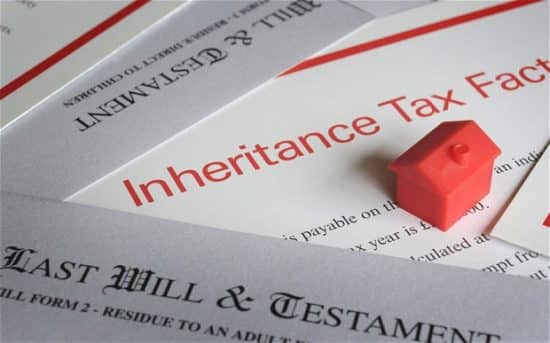Historically, a considerable portion of the nation’s wealth has been in the hands of a few. As a result, millions of American families have less wealth and, as a result, fewer chances than they would otherwise. Furthermore, because the wealthiest are mainly white, this great wealth concentration reinforces obstacles that make it more difficult for persons of color to advance. State taxes on inherited wealth, such as estate and inheritance tax, can be an effective instrument for fostering more broadly shared prosperity. So in this article, we’ll learn more about inheritance tax, the states that have it, the calculations, and also discover ways to avoid excessive inheritance taxes.
What Is Inheritance Tax?
An inheritance tax is a tax levied by some states on persons who are inherited or receive assets from a deceased person’s estate. The rate of inheritance tax depends on the beneficiary’s state of residence, the value of the inheritance, and the beneficiary’s relationship to the decedent.
Some countries refer to it as “death duty,” and sometimes “the last twist of the taxman’s knife.”
Inheritance Taxes: What You Need to Know
An inheritance tax differs from an estate tax. An estate tax is levied on the estate before its assets are distributed, whereas an inheritance tax is levied on a recipient when assets are received.
There is no federal inheritance tax in the United States. While the United States government directly taxes large estates by levying estate taxes and, if applicable, income taxes on any revenues from the deceased estate, it does not levy inheritance taxes on those who acquire assets from an estate.
In the United States, inheritance taxes are strictly a state tax. Inheritance taxes are levied in six states: Iowa, Kentucky, Maryland, Nebraska, New Jersey, and Pennsylvania. Your inheritance will be taxed, and at what rate, depending on its worth, your relationship to the deceased, and the rules in effect where you live.
The state where the heir or beneficiary resides assesses inheritance tax.
Read Also: Beneficiary Of A Trust: Definition, Rights & Best US Practices.
Inheritance Tax Calculations
If an inheritance tax is owed, it is only charged to the amount that exceeds an exemption amount. They normally assess inheritances taxes on a sliding scale above such limits. Rates typically start in the single digits and climb to between 15% and 18%. The exemption you obtain and the rate you pay may differ depending on your relationship to the deceased, more so than the value of the assets you inherit.
In general, the greater your relationship to the decedent, the greater the exemption and the lesser the rate you’ll pay. In all six states, surviving spouses are immune from inheritance tax. Domestic partners are exempt as well in New Jersey. Except in Nebraska and Pennsylvania, descendants pay no inheritance tax.
In most cases, life insurance payable to a named beneficiary is not subject to inheritance tax. If the policy was the beneficiary of an estate or a revocable trust, it may be liable to an estate tax.
Thresholds for Inheritance Tax In Different Stataes
Most states impose an inheritance tax on bequests over a particular sum. In a few cases, the size of the estate is considerable. As an example:
When property passes to the recipients in Iowa, they don’t owe any tax if the estate is worth less than $25,000.
In Maryland, inheritances from estates with a value of less than $50,000 are also tax-free.
There are further exemptions for heirs, depending on their relationship to the deceased. Here are the minimum thresholds and recipients for whom inheritance tax may be levied.
Iowa
Immediate family (spouses, parents, and children) and charity are exempt up to $500 in Iowa. The tax rate on others ranges from 5% to 15% of inheritance.
Kentucky
Immediate family members (spouses, parents, children, and siblings) are exempt; other receivers are exempt up to $1,000. The tax is levied on a sliding scale dependent on the quantity of the inheritance and comprises a minimum amount as well as a percentage ranging from 4% to 16%.
Maryland
Immediate family (parents, grandparents, spouses, children, grandchildren, and siblings) and charities are exempt in Maryland; other beneficiaries are exempt up to $1,000. Tax is levied at a rate of 10%.
Nebraska
Spouses and charities are totally exempt in Nebraska; immediate relatives (parents, grandparents, siblings, children, grandkids) are exempt up to $40,000. All others are excluded up to $15,000 in total. The tax rate is one percent, thirteen percent, or eighteen percent.
New Jersey
Immediate family (spouse, children, parents, grandparents, grandkids) and charity organizations are exempt in New Jersey. Siblings and sons/daughters-in-law are excluded up to a maximum of $25,000. The tax rate ranges from 11% to 16%, depending on the quantity of the inheritance and the relationship.
Pennsylvania
Spouse and small children are exempt in Pennsylvania. Adult children, grandparents, and parents are excused from paying up to $3,500 in taxes. Depending on the relationship, the tax rate is 4.5 percent, 12 percent, or 15 percent.
Estate Tax vs. Inheritance Tax
Inheritance taxes and estate taxes are frequently referred to as “death taxes.” They are, however, two distinct types of taxation.
Both levies are based on the fair market value of a deceased person’s property as of the date of death, which is usually the day of death. However, an estate tax is levied on the value of the decedent’s estate and is deducted from it. An inheritance tax, on the other hand, is levied on the value of the inheritance received by the beneficiary and is paid by the beneficiary.
However, if you are the lone beneficiary of an estate, the value of the estate and the amount you inherit may appear to be the same. However, they are technically liable to distinct taxes. Furthermore, in some cases, an inheritance may be subject to both estate and inheritance taxes.
The federal estate tax, according to the Internal Revenue Service (IRS), is only levied on estates worth more than $11.4 million in 2019 and 11.58 million in 2020. There is no estate tax if the deceased person’s estate goes to his or her spouse.
If a person inherits a big enough estate to trigger the federal estate tax and lives in a state with an inheritance tax, they must pay both taxes. Before it is distributed, the estate is taxed, and the inheritance is then taxed at the state level.
They may also be subject to a state estate tax. Connecticut, District of Columbia, Hawaii, Illinois, Maine, Massachusetts, Maryland, New York, Oregon, Minnesota, Rhode Island, Vermont, and Washington State still have these levies as of 2021.
Maryland is the only state that levies both an estate tax and an inheritance tax. Let’s see how one can avoid or limit inheritance tax in the next section.
How to Avoid Inheritance Tax
While there are many exclusions and exemptions to inheritance tax, particularly for spouses and children, there may still be a desire to avoid or limit them, especially if you have considerable assets to leave. Essentially, ways to avoid the inheritance tax involve removing assets from your estate and/or delaying their distribution. Among the most common are:
- Purchase a life insurance policy in the amount you desire to bequeath and name the person to whom you wish to leave the policy as the beneficiary. Inheritance taxes do not apply to the death benefit of an insurance policy.
- Put assets under a trust, preferably one that is irrevocable. This basically eliminates them from your estate and their inheritance status upon your death. When you create the trust, you can specify a timetable for the distribution of the funds.
- Trusts are intricate beasts that must be properly and meticulously set up and worded in order to comply with state tax rules. So don’t try it without the assistance of a trust and estates attorney.
- Instead of a lump-sum bequest upon your death, consider donating money to recipients gradually while you’re still alive. Gifts are not frequently taxed in states.
How Much Money Can You Inherit Without Having to Pay Taxes?
The amount you can inherit without having to pay income taxes is limitless. Beneficiaries owe no income tax on the sums they inherit.
In terms of inheritance taxes, the amount of tax owed varies depending on the state, the quantity of the inheritance, and the heir’s relationship to the deceased. In the six states that have an inheritance tax, the rates range from 1% to 18% of the bequest.
What Is the Inheritance Tax Rate in the United States?
It is, strictly speaking, 0%. There is no federal inheritance tax, which is a tax on the total amount of assets received from a deceased person.
The Internal Revenue Service (IRS) can, however, levy a tax on all of the assets that a deceased person leaves behind, known as their estate. This inheritance tax applies to estates worth more than $11.7 million in 2021. Only the portion of an estate that exceeds this amount is subject to the tax. The rate is on a sliding scale ranging from 18% to 40%, plus a flat payment.
Do Beneficiaries Have to Pay Inheritance Taxes?
It is determined by who they are and where they live. Only beneficiaries who live in one of the six states that levy inheritance taxes are subject to the tax.
Surviving spouses are never subject to inheritance taxes. Other direct family members, such as the deceased’s parents, children, and siblings, are excluded to varying degrees depending on the state. They may be allowed to inherit up to a specific amount tax-free, or they may be required to pay at different rates.
Inheritance taxes primarily affect distant relatives or unrelated heirs.
In conclusion
Only inhabitants of six states are subject to inheritance taxes. And they mostly apply to distant relatives or others who have nothing to do with the deceased. Spouses are always excluded, and immediate family members (children, parents) are frequently exempt as well. Siblings, grandkids, and grandparents receive more lenient tax terms if they are taxed at all (larger exemptions, lower rates).
Nonetheless, inheritance taxes can be levied on relatively small sums—as little as $500 in rare cases. Those who want to leave bequests to persons who are vulnerable to inheritance should consider some estate-planning measures to avoid inheritance tax “the last twist of the taxman’s knife.”
Inheritance Tax FAQ’s
How much can you inherit without paying tax UK?
If the deceased’s estate is worth less than £325,000 (or £650,000 for a married couple), you do not have to pay inheritance tax. You are the deceased’s surviving spouse or civil partner, and they have left you everything.
What states have inheritance tax?
Iowa, Kentucky, Maryland, Nebraska, New Jersey, and Pennsylvania are the states that will collect an inheritance tax. Each has its own laws governing who is exempt from the tax, who must pay it, and how much they must pay.
What's the difference between estate tax and inheritance tax?
An estate tax is an amount deducted from someone’s estate after they die, whereas inheritance tax is the amount deducted from the beneficiary – the person who inherited the money — when they get it. When someone dies, one, both, or neither of these factors may play a role.






